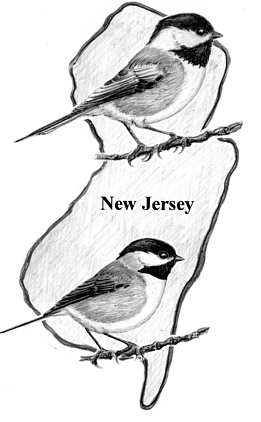
Dear Bird Folks,
You need to settle an argument for me. I live in Elmwood Park, New Jersey and have a yard full of Black-capped Chickadees. My father-in-law lives south of me in Whiting, New Jersey and he also has a yard full of chickadees, only he claims that his birds are “Carolina Chickadees.” Carolina Chickadees?? Aren’t those southern birds? I think he’s way off on this one, but I can’t seem to convince him. Could someone living in New Jersey have Carolina Chickadees? And if so, how could I tell?
-Colleen, Elmwood Park, NJ
Good Luck Colleen,
Good luck trying to convince your father-in-law of anything. If he’s anything like my father-in-law, Moses wouldn’t be able to get him to see things differently. My father-in-law would argue with a mirror and wouldn’t stop until his own reflection gave up and left.
To make your problem worse, the Black-capped and Carolina Chickadees are extremely similar birds. It won’t be easy for me to prove your argument. There are no clear-cut answers. This is not simple like answering which are smarter, cats or dogs (dogs) or which is more boring to watch on TV, golf or a test pattern (too easy). These two species of birds are practically identical. Fortunately, for most everyone else in the country, they don’t have to worry about it. They either have a Carolina Chickadee or a Black-capped Chickadee, not both. There are a few exceptions to this and one of them is good old NJ.
For the most part the Black-capped Chickadees is considered to be a northern bird, while the Carolina Chickadee is a bird from the south. Like the North and South of old, these two species don’t get along and rarely mix. Ironically, if you look at a range map, you will notice that the borders between the ranges of these northern and southern birds follow very closely that of the Mason-Dixon Line. Check it out. Historians don’t even know about this amazing fact, but we do.
How can we tell which one of these two birds you have in your yards? Since neither one of these birds are serious migrators, there is very little chance of a black-cap being south of New Jersey, especially during the breeding season. So for most of us it’s a non-issue. However, anyone living along the border of the two ranges, it’s a major challenge. And unfortunately for you Colleen, Whiting, NJ is close to the border of both birds.
How can the borderline people tell? There are a few subtle differences in behavior and the songs of the two birds that are fairly obvious. As you might expect, the northern birds tend to be rude and arrogant, while the southern chickadees are overly friendly for no apparent reason. The northern bird’s song is clear and distinctive, but the southern bird has a much slower “chick-a-dee, dee, dee, y ‘all,” mixed in with a touch of gospel.
Besides those bad stereotypes, here are a few actual field marks. But remember, only those of you who live or visit the mid-atlantic states need to pay attention here, everyone else can stop reading, if you haven’t done so already.
The Carolina Chickadees are slightly smaller, while the black-caps tend to have longer tails and seem to show more white on their wings when at rest. The Carolina has a smaller and neater black bib, with the bib of the black-cap being a bit more ragged along the bottom edge. Most importantly, if you look real closely at the birds and notice a small lobster on the bib, forget those birds, they’re from Maine.
The two birds have distinct songs but, unfortunately, the closer the two species are to each others’ ranges the less distinctive the songs become. This only adds to the confusion. And to make things even more confusing, near the border, the two species sometimes interbreed, creating weird hybrids that have bad teeth and play the banjo.
After studying the range maps Colleen, I’m pretty sure that your father-in-law is correct. He does have Carolina Chickadees in Whiting, which is in the southern half of NJ, while you, living in the North, have Black-caps. It does seem odd that in such a small state, you could have such a sharp contrast in bird populations. It’s nice to know that something interesting is finally going on in New Jersey.
My advice would be to ignore all of those field marks that I gave you earlier and to simply watch and listen to birds at your father-in-law’s feeders. If they appear or sound a bit different than the birds that you know so well in your yard, they are probably Carolina Chickadees. If, however, they act rude, arrogant and have lobsters on their bibs, they are Black-capped Chickadees from the north.